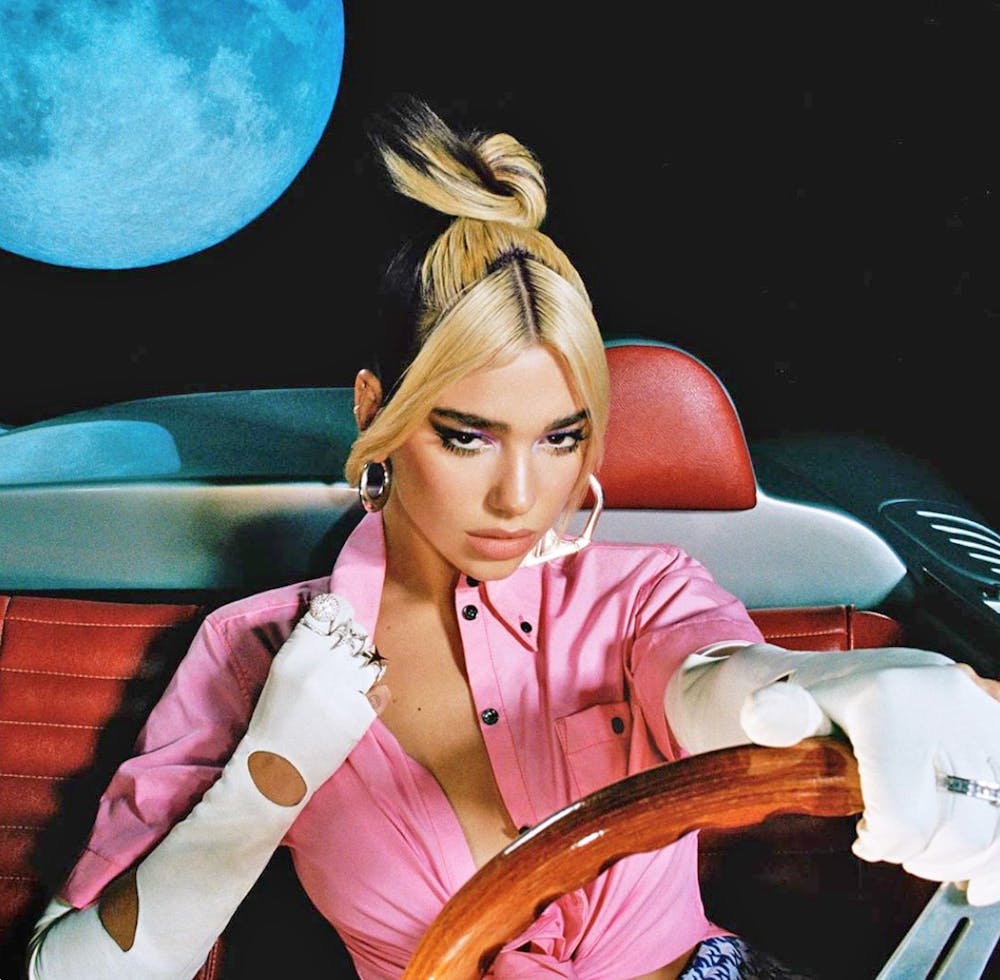“You want what now looks like?” British and Kosovar Albanian pop superstar Dua Lipa sings on the title track of her sophomore album.
“Let me give you a taste.”
The opening lines of “Future Nostalgia,” released a week earlier than anticipated on March 27, proclaim the ethos of Lipa’s career: “You want a timeless song, I wanna change the game.”
Lipa’s 2017 breakthrough smash hit, “New Rules,” was a well-crafted feminist anthem that drew praise from all corners of the music industry. Her 2018 collaboration with Calvin Harris, “One Kiss,” was the highest-selling song in the U.K. the year it was released.
She’s already given us timeless songs. And now, she’s changed the game.
Prior to its release, singles “Don’t Start Now” and “Physical” set the tone for “Future Nostalgia” as a disco-inspired record with modern pop sensibilities. The former is a punchy banger laced with a biting narrative, while the latter bursts with more energy than the average dance floor could ever handle.
Separately, those are lofty expectations to set for a record. And as a title, “Future Nostalgia” is a relatively lofty promise. Not only will the album evoke sounds of the past, it’s supposedly meant to push the synth-pop genre into new territory.
And it does. Lipa glides effortlessly past the expectations she’s set for herself.
Co-writes from artists like Tove Lo and production credits from industry titans like Jeff Bhasker help Lipa shine even brighter than she did on her debut album. Each disco-infused, synth-pop banger is a feat of songwriting, production and vocal performance. Whether it be the mystery of new romance or the allure of a reckless fling, Lipa sells each ethereal fantasy with aplomb.
While the album is front-loaded with its singles, the introductory beats of album cut “Levitating” immediately continue to push the album’s momentum forward. Its incredibly catchy chorus, inviting listeners to “fly away with [Lipa],” keeps the ball rolling through the sultry lower-tempo “Pretty Please” and onto the enthusiastic “Hallucinate.”
Subsequent songs “Love Again” and “Break My Heart” put Lipa’s versatility on display for all to see. “Love Again” wields strings to tap into an ABBA-esque side of Lipa, whilst “Break My Heart” portrays Lipa co-opting the way Charlie Puth might sing, for the first time in his career, a good song.
Although the album is packed with heavy hitters from cover to cover, its final punch is unfortunately its weakest – “Boys Will Be Boys” sees Lipa sing quite literally and self-referentially about toxic masculinity and institutionalized sexism.
Enjoy what you're reading?
Signup for our newsletter
It’s a necessary story to tell, but the directness in its lyrics (“If you’re offended by this song, you’re clearly doing something wrong”) is a stark regression from the wordplay and smooth oration of the album’s first 10 tracks.
The song is a removal from the album’s airtight fantasy, transplanting the listener into a thoughtscape more akin to MARINA’s 2019 single “To Be Human” – a similarly well-intentioned “woke pop” misstep. And while the messages of “Boys Will Be Boys” are sound, songs like Courtney Barnett’s 2018 single “Nameless, Faceless” broadcast the progressive discourse with a little more tact.
That being said, “Boys Will Be Boys” isn’t a stain on an otherwise perfect album; it has the fortune of standing out as a good song among great ones. The fact that it does stand out is a testament to the strength of the record.
A whopping 28 writers and a wide array of producers are credited across “Future Nostalgia.” Yet despite the massive collaborative effort, the entire record screams “Dua Lipa” in ways most other pop records of late have failed to proclaim a singular identity. It’s even more impressive, then, that the album manages to maintain its cohesion and character without skipping a beat.
During the buildup to the “Future Nostalgia” era, reports of Lipa collaborating with artists like Miley Cyrus and Normani drummed up fan hype for an album star-studded with features. While Lipa has confirmed her intent to release a deluxe edition of the album, meaning we may still get to hear some of those songs, it speaks to her staying power that she created a record of such high caliber with no names billed but her own.
“Future Nostalgia” is a legacy-creating moment for Lipa. It joins the ranks of Taylor Swift’s “1989” and Carly Rae Jepsen’s “Emotion” as reputable pillars of modern mainstream pop, the first release of the new decade to do so. It’s a point that music historians will be able to reference for years to come.
Not only is Lipa here to stay, she’s created a mold for artists to fill in the future. And when they try, we’ll be nostalgic for the original.
Rating: 9.5/10




